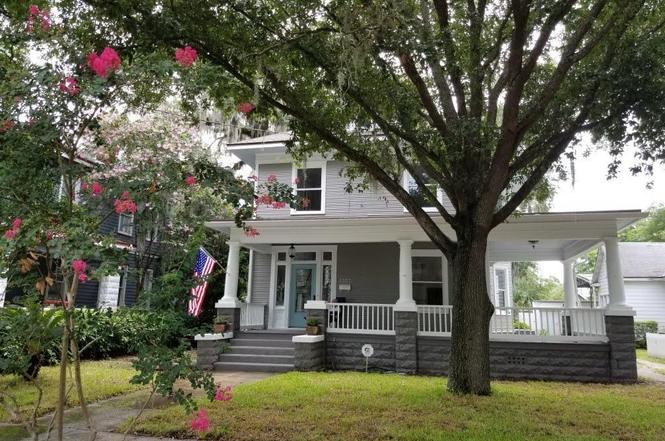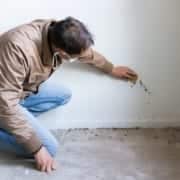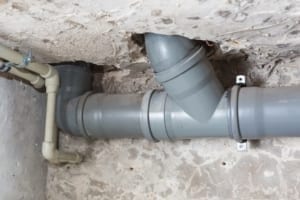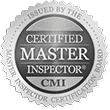Home inspections are a vital part of the home buying and selling process but do you know what home inspectors actually do or if a house can even fail a home inspection? Luckily, we’ve put together the top twenty most frequently asked questions about home inspections and asked the professionals to answer them. Here is everything you need to know about your home inspection.
1) What is a home inspection?
Without a comprehensive home inspection, you could end up paying thousands of dollars in repairs or possibly buy a house that is unsafe.
Here’s an overview of each element of a home that must be inspected.
Foundation: the inspector will take a look at the foundation to examine it for cracking and shifting, and to ensure that water is draining away properly from the foundation and basement
Lot: the lot will be examined for proper grading and drainage and the quality of walkways and the driveway will also be assessed.
Roof: the roof will be examined for faulty shingles, damaged flashing, signs of water damage, and overall integrity
Exterior: the exterior siding, windows, doors will be examined to assess their overall wear and condition
Attic: the attic will be inspected to ensure that it is properly ventilated and insulated
Interior: the interior of the home will be examined, including wall outlets, lighting fixtures, walls, doors, and all other such surfaces and areas
Basement: the basement is inspected to ensure that it is free from leaks and water damage. Issues like mold and water leaks are also quite common in basements
Electrical: your home inspector will make sure that all electrical outlets, switches, and lighting fixtures work
Plumbing: the functionality of the plumbing systems will be checked, including water pressure, hot and cold water, as well as functionality of all sinks, bathtubs, showers, and other systems
Appliances: major appliances will be tested and verified for proper functionality
HVAC: the furnace will be examined for integrity, and problems like cracks or wear and tear. Air ducts and air conditioning systems will also be examined and tested
Randy Lambert
Lambert Home Inspections – Bristow, VA
2) Why do I need a home inspection?
If you are planning to buy or sell a home, it is recommended that you hire a certified home inspector to conduct the inspection. This is one way to learn the condition of the home and potentially gain more negotiating power during the sale/purchase of the home.
When touring a home, pay attention to anything that seems strange as it might be a red flag. Take note of any visible damage as well, as it might not be a problem now but it could turn into an expensive fix later.
These issues don’t have to be a deal breaker. They can, however, help you get a lower price for the home if you’re the buyer. Most home buyers agree that it’s worth spending a few hundred dollars on a home inspection to save a few thousand down the road.
Kevin Anderson
Elk Valley Home Inspections – Kingston, TN
3) How much is a home inspection?
Based on more than 80,000 home inspections conducted during the last year, our data shows that the average home inspection costs $358.
Variables that will affect the cost include:
- Location/region/travel time
- Size of the home
- Age of the home
- How hot or cold the local real estate market is
- How many inspectors are in the area and how busy they are
- Additional services such as mold inspections or radon testing
The US Department of Housing and Urban Development (HUD) gives a typical price range of $300-$500, and cautions that “cost does not necessarily reflect quality.”
We recommend that you do your research. Take a look at the website and the reviews of the inspector that your agent recommended. Get a quote from them and a couple of others, and don’t shop on the cost or price alone.
Regardless, decent home inspectors are well worth the investment. Whether it gives you leverage to ask the seller to cover more fixes or sets your expectations for what to budget for, getting a home inspection is one of the smartest investments you can make in your new home.
Kevin Wagstaff
Spectora
4) Why can’t I do a home inspection myself?
When you’re purchasing a home there are many things to consider. From negotiating the price to understanding the resale value, the tasks can become overwhelming.
People often turn to their mechanics when purchasing a used car so why wouldn’t you turn to a home inspector when shelling out hundreds of thousands more for a house?
A professional home inspection can turn up issues that otherwise would have went unseen, such as the wrong gauge wire being used in the breaker box inlet, or an incorrectly hung cabinet that could become a hazard.
A home inspector’s job isn’t to spread doom and gloom, they’re your advocate. While we’re sure your realtor has done a great job showing you the house’s features and educating you on the school district, they typically aren’t able to teach you about the house structure or utilities.
Your home inspector will be able to shine a light on vital information that you likely wouldn’t have caught until after you had purchased the house.
Ron Fast
First-In Home Inspection – North Canton, OH
5) What does a home inspection include?
As a home is the largest purchase most folks will ever make, a home inspection is always recommended before buying a home. While some little quirks are nothing to worry about, there may be more serious issues that only a professional home inspector can assess.
Without a comprehensive home inspection, you could end up paying thousands of dollars in repairs or buying a house that is unsafe due to issues like water damage, foundation issues, or even asbestos or lead. A certified home inspection should cover the foundation, lot, roof, exterior, attic, interior, basement, electrical, plumbing, appliances, and the heating/cooling system. The primary purpose of these examinations is to identify structural and major system flaws, especially anything safety related.
Grant Waller
PacWest Home Inspections – Beaverton, OR
6) Can a house fail a home inspection?
Contrary to what many people believe, there is no grading or pass/fail system for a home inspection. The home inspector simply evaluates the condition and quality of the home objectively, and then informs both the buyer and seller of their findings.
However, if a glaring issue is found, the seller may be held responsible to fix it before the home can be legally sold. For instance, if asbestos or mold is found in the home or if there is a code violation or other serious safety issue, the seller would have to remedy the situation before they could sell their home.
Additionally, buyers may be allowed to invoke their home inspection contingency and walk away from the transaction if a major issue is found.
Curious what the most common culprits are in a home inspection? Here’s a quick list.
- Roof and gutter issues (leaks, damaged/clogged gutters, etc.)
- Faulty wiring/electrical problems
- Poor grading or drainage around the home
- Dampness or mold/mildew in basements
- Cosmetic wear and tear (peeling wallpaper, dirty/damaged carpets, cracked driveways/walkways, etc)
- Plumbing issues such as leaks, clogged drains, poor flow
- Inadequate ventilation or insulation
- HVAC problems
Whether you’re a buyer or a seller, most home inspection findings are not deal breakers and will simply require you to negotiate a proper rate for the home based on what the inspector finds.
Ben Hoffman
Hoffman Home Inspections – Wichita, Kansas
7) When do I call a home inspector?
It is recommended to get a home inspection before you make an offer on a home. At the very least you want to get the inspection completed before you close on a home. This means you still have a chance to pull out of buying the home if the inspection turns up massive problems that you are not willing or cannot afford to fix.
Having a home inspection done before making an offer is the best time to do it. However, even if you make an offer, be sure to have the home inspection done before the closing date or you will be responsible for any problems that may exist with the home.
Rick Vecchio
GCA Home Inspections – Brick, NJ
8) Do I have to be there when the home inspection is happening?
If you’re selling your home and having a pre-listing inspection, it’s a good idea to stick around for the inspection to give you some insight on what you should fix before listing your home. However, if the buyer hired the inspector, there’s no reason for you to be present.
If you’re buying a home, it’s not required that you’re present for the home inspection but it’s a good idea to be there anyway. Attending the home inspection on a property you’re considering buying gives you a great opportunity to get a better understanding of the condition of the home, and any potential issues that may be present. You may be thinking that you’ll just be able to see these in the report, which is true, however, walking through the home with the inspector will make these items easier to understand because they can explain it to you during the process.
Furthermore, being present for the home inspection gives you the opportunity to ask the inspector questions about the home. It’s a good idea to ask about the parts of a home that are most expensive to repair/replace, such as:
- Roof: replacing a roof can cost thousands
- Insulation: insulation has a huge effect on power bills
- Electrical system: rewiring a home can be an expensive task
- Plumbing: plumbing problems can be very costly to fix
- HVAC System: these systems usually must be replaced every 10-15 years
- Structure: if there is any kind of structural damage at all, you shouldn’t buy the home
- Grading/Drainage: improper grading and drainage can cause foundation damage
Matthew Miller
Bless this Nest – Fort Lauderdale, FL
9) What if the home inspection report reveals problems?
If you find serious issues, you can back out of the sale due to a home inspection contingency clause or you can ask the seller to fix the issues before moving forward with the purchase of the home.
The seller is not required to make any repairs, except those which address structural defects, serious safety issues, or building code violations. Examples include:
- Issues that violate federal or state code
- Structural or mechanical problems
- Defects that cause safety issues
- Mold
- High radon levels
- Infestation
Cosmetic defects do not have to be repaired before the seller can sell their house, as they are not a hazard. You can ask them to make these repairs but they can refuse.
Typically the seller will offer you a repair credit and knock the price of the home down, based on the expected cost of the repairs. This is usually the best option when negotiating because some home repairs, like fixing a roof, can take weeks and become very inconvenient for both the buyer and the seller.
Drew White
AmPro Inspections – Colorado Springs, CO
10) How long does an inspection usually take?
While there are no set standards when it comes to the length of time it takes to inspect a home, the process usually takes about two to three hours. For larger homes or homes with additional features, this process will take longer, while for small homes and condos an inspection may only take an hour or two.
Here are some additional factors that impact the amount of time it takes to conduct a home inspection:
- Size of the home
- Age of the property
- Total systems to be inspected (HVAC, electrical, water heaters, pools, multiple kitchens, etc.)
- Accessibility to areas that need to be inspected
- Weather conditions
- State requirements
- Time spent answering clients’ questions during the inspection
- One or more inspectors on site
- Additional services (radon test, mold test, water test, etc)
A home inspection isn’t something you want to rush through. This is an important step in the home buying process and affirms the value of your investment.
James Saunders
Certified Inspectors of North Carolina – Rock Fish, NC
11) What’s included in the home inspection report?
A home inspection report is a valuable tool that can give you an array of information on your new home, expose potential problems, and address hazards that aren’t easily seen by an untrained eye. So, what’s included?
The home inspector will visually inspect the roof for damage, including shingles, gutters, downspouts, skylights, chimneys, ridge caps and evaluate for any potential roof penetrations. You’ll also get an overall grade on the general condition of the roof.
To ensure your home is breathing well and is maintaining a good level of efficiency, the home inspector will evaluate the condition and operation of the insulation and ventilation in crawl spaces, attics, and foundation areas as well as any exhaust systems.
A full walk around the exterior of the property and an up-close inspection of the following:
- Siding
- Windows
- Exterior doors and locks
- Flashing and trim
- Walkways
- Driveways
- Stairs
- Patios
- Decks
- Drainage systems
- Basement and foundation
The home inspector will go over the HVAC systems with a fine-toothed comb, checking for leaks, proper operation, thermostat locations, and evidence of proper maintenance.
Busted pipes and leaky valves can create thousands of dollars in repairs. Your home inspector will ensure the proper state of the home’s plumbing, which includes checking for leaks, venting systems, hot water heater operation, etc.
Lastly, home inspectors will spend a large portion of their time inspecting necessary but potentially dangerous parts of your home.
Steve Bennett
Redbud Property Inspections – Oklahoma City, OK
12) How do I know if a home inspector is qualified?
Here are some things to consider while searching for a qualified home inspector:
Credentials
Most home inspectors are licensed by the state in which they inspect. If an inspector is state-regulated, see if there are any reports of complaints against the inspector.
You should also check to see what other credentials the inspector has, such as:
- The International Association Of Certified Home Inspectors (InterNACHI)
- The American Association Of Home Inspectors (ASHI)
- The National Academy of Building Inspection Engineers (NABIE)
- The All American Association of Home Inspectors (AAAHI)
- The North American Association of Home Inspectors (NAAHI)
Reviews
In some states, there are no requirements for home inspector licensing or certification. If you’re looking for a home inspector in one of those states, it’s a good idea to check their reviews. Yelp and Google are great resources, as opposed to the inspector’s website where they can remove negative reviews.
Find Out What They Inspect
Home inspections should be thorough, so you’ll need to find an inspector who will leave no stone unturned. If an inspector is able to inspect everything from the plumbing system and foundation, to the attic and electrical system, they will be your best bet. You should also ask for a sample report so you know what you’ll be getting.
Stephen Whittington
Whitt Inspections – Tampa, FL
13) Does the inspector need to be specialized in residential structures?
General home inspectors specialize in residential structures, whereas some obtain additional training and certifications to inspect commercial properties as well. While inspectors tend to specialize in one or the other, some do both.
You don’t necessarily need to hire a property inspector that specializes in residential inspections. Just because an inspector specializes in one particular area doesn’t mean they are better than their competition who might offer a variety of other services.
Do a quick online search to find a list of home inspectors in your area and then dig deeper to find one you trust based on their reviews and credentials.
Call a few inspectors to get more information before making your decision. Schedule a phone interview to ask any questions you may have, such as:
- How much will my inspection cost?
- When can you examine my home?
- How long have you been working in the industry?
- Do you have insurance coverage?
- What happens if you miss something?
- How long after the inspection will I get the inspection report?
Ask for a copy of their standard home inspection checklist or a sample inspection report. This will give you a better idea of what parts of the home will be inspected if you hire that inspector— and what’s not included. For example, some home inspections won’t include things like pools, chimney, irrigation systems, sewer scope, asbestos, lead, radon, mold, or termite inspections so you may need to hire other professionals or pay additional fees to have these systems checked.
John Reim
Bee Sure Home Inspection Services – Grayslake, IL
14) What is the difference between a home inspector and an appraiser?
When you’re getting ready to buy or sell a home, having a home inspection and appraisal is part of the process. Because it’s such a huge investment, your home needs to be evaluated. Some people think that appraisals and inspections are the same thing but they are, in fact, very different.
An appraisal is a concept of pricing a home based on specific factors, such as:
- Location of the home
- Proximity to desirable schools and other public facilities
- Size of the lot
- Size and condition of the home itself
- Recent sales prices of comparable properties
The appraiser’s primary goal is to protect the lender against owning overpriced property. That’s why an appraisal is required before you can get a mortgage on your home. Appraisers do not conduct in-depth inspections of the home but they may take note of visible signs of neglect. This includes cracked walls, chipped paint, broken windows, damaged flooring, etc.
An inspection is a much more thorough overview of your home. Whereas an appraisal is required in order to get a mortgage, an inspection is not mandatory but it’s still a good idea to get one. A home inspector examines every aspect of the home, looking for issues that could negatively affect the buyer’s investment. While the appraiser is obligated to protect the lender, the home inspector is most often there to protect the buyer from making a poor purchase.
James Taylor
4 Corner Inspections – Batavia, OH
15) What is the process of a home inspector?
Home inspections are an important part of buying a home. Without a comprehensive home inspection, you could end up paying thousands of dollars in repairs or buying a house that is unsafe due to water damage or foundation issues.
During the inspection, buyers are encouraged to tag along with the inspector and ask questions about the home. Upon completion, the inspector usually gives the client a verbal overview of their findings. Most home inspectors provide a comprehensive inspection report in a web-based or PDF format within a day or two of the inspection. Home inspectors are usually happy to answer any questions you have about the report.
Josh Crepps
Crepps Home Inspection – Coxs Creek, KY
16) Do I need a home inspection for a new construction?
Your newly built home is likely to have all of the latest energy-saving features and comforts that you could ever want. But it’s always a good idea to get a home inspection, even on a newly constructed home.
There may be undisclosed issues or shoddy workmanship. Just because a home is brand-new doesn’t necessarily mean that it’s been built with the highest workmanship standards in mind. The plumbing could have serious issues, the roof may be installed incorrectly, there may be issues with the chimney, and so forth.
Just like a regular home inspection, you won’t know about these problems unless the home is inspected. Even a single careless contractor or a tiny mistake made when building the home can cause serious damage. It’s possible the home may only be up to minimum standards.
Building inspectors only have to sign off on the construction of a new home and make sure that it’s up to code. These inspectors don’t work for you, they work for the county. They are only there to determine if the house doesn’t violate any building codes. So if the house just barely meets standards, they’ll likely sign off on it.
For a truly deep look at your home’s systems, you need to hire a home inspector. If you don’t, you’re taking an unnecessary risk.
BJ Johnson
Inside and Out Property Inspectors – St. Augustine, FL
17) Can a home be inspected if it’s covered in snow?
Snow can pose a challenge for home inspectors, as a large amount of snow limits what can be inspected properly. Those areas include the AC unit, roof, and checking for proper drainage.
All other areas of the home can still be properly inspected during the winter, however, and it may even bring more issues to light that may have been missed were it to be inspected in the warmer months. Extreme weather conditions cause damage and stress to a home that is only visible to a trained professional. If that damage goes unnoticed it can quickly snowball into an emergency situation when the season changes.
Homes with pipes that have frozen and cracked underneath the house cause slow leaks and water intrusion. During the winter months, those failures aren’t always recognized due to freezing temperatures. Pipes and sprinkler systems that may not have been properly winterized could be an expensive surprise in the spring.
While you can’t have some systems accurately tested in the winter, you can account for it in your home purchase contract. As a buyer, you can request a seller “reserve for repairs of uninspected areas” that can be negotiated and agreed upon.
Josh Berry
New Day Home Inspections – Portland, OR
18) Do home inspectors inspect pools, fences, or other outside structures?
Typically, basic home inspections don’t include comprehensive overviews of areas like pools, fences, and outside structures. When buying a house with a pool or other unique feature, it’s vital that each part of the purchase receive the same attention. That means you need to call a professional who knows these features and their potential pitfalls. Your home inspector may be able to provide inspection services for these areas at an additional fee or refer you to someone who can.
According to ASHI‘s Standards of Practice, section 4.2, E, “the inspector is not required to inspect out-buildings other than garages and carports.” Some home inspectors offer outbuilding inspections as an add-on service and some include it in the home inspection even though it’s not required. That’s entirely up to the inspector and local regulations. If local regulations require an inspection of every building on the property, then the inspector needs to follow those rules and include in the home inspection.
Jerry Campbell
Cal-Spec Home Inspections – Coachella, CA
19) Do home inspectors tell me if I should buy the house?
While a home inspector cannot necessarily tell you whether or not to buy a house, they will give you an unbiased opinion of the current condition of the property and let you make your own decision. A home inspector will be honest and tell you if an expensive repair is needed but because everyone’s situation is different, that may not necessarily be a deal breaker for you. Some buyers might be looking for a good deal on a fixer-upper.
Some common home inspection deal breakers are:
- Foundation issues: Issues with the home’s foundation are one of the costliest repairs, running tens of thousands of dollars – maybe even more for large homes with major problems
- Outdated wiring: Old wiring can pose serious safety issues and fire hazards
- Termite infestation: Although you can get rid of termites and then protect against them returning, you need to consider the structural damage they’ve already done to the home
- Mold: Most molds aren’t toxic and can be easily removed with some special spray, however, other molds are very serious, potentially deadly health hazards
Brian Hickory
Hickory Property Services – Steamboat Springs, CO
20) I’m selling my home, should I get a home inspection before putting it on the market?
A seller’s home inspection is less common than a buyer’s home inspection but home sellers are realizing more and more that there are benefits to having their homes inspected before they even list their homes to sell.
The biggest benefit of a seller’s home inspection is to know all the potential issues before they are brought up in the buyer’s inspection report. This allows the seller to make sure any repairs get done ahead of time and most likely at a better price than the buyer would ask for as a concession during negotiations.
Home sellers can also be more realistic in their asking price, depending on any problems you want to leave “as-is.” Sellers can also include the inspection report with the disclosure statement, reducing their liability for any new findings.
Getting a home inspection prior to selling a house can sometimes even find safety hazards before agents and visitors tour the home, as these hazards could turn into a very expensive liability. The last thing a seller wants is for someone to fall down a flight of steps and get injured due to the lack of a safety railing that they didn’t even know they needed.
David Bates
TruScope Home Inspections – Edmonton, AB
This article originally appeared on Redfin
















